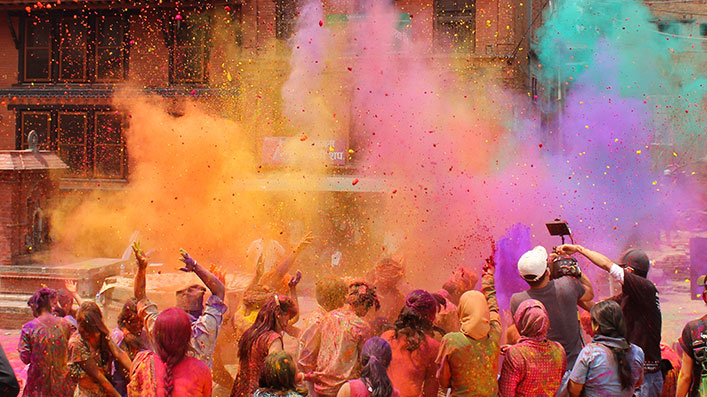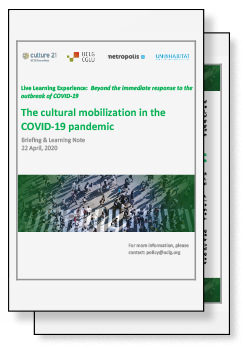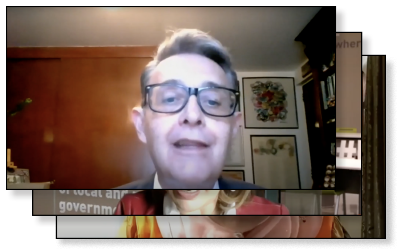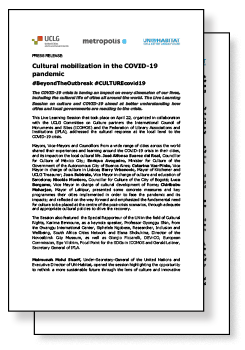Culture
Under-Secretary-General of the United Nations and Executive Director of UN-Habitat
UCLG Secretary General
Secretary on Culture, Mexico City
Vice Mayor on Culture, Lisboa
Minister of Culture, Autonomous City of Buenos Aires
Vice Mayor on Cultural Development
Vice Mayor in charge of culture and education of Barcelona
Councillor for Culture of the City of Bogotá
Mayor of Lalitpur
UN Special Rapporteur on Cultural Rights

Context

Cities are centres of creativity and innovation. They are repositories of cultural expression, heritage, identity, history, memory and knowledge, and are the engine of social, economic and cultural progress. As cities hope to face inequality and promote an inclusive, sustainable and solidary environment, culture is fundamental to widen the freedoms of people, build a strong social fabric, bridge economic gaps and help address and achieve sustainable urban development.
The cultural sector has been one of the most impacted by the COVID-19 outbreak. Physical distancing measures have made it impossible to hold events, exhibitions, concerts or festivals and many hubs for cultural production and exhibition – community centres, museums and libraries – have had to shut down. Workers in the sector, usually freelancers, have suddenly lost their source of income and are uncertain about the months to come.
In parallel, cultural activity online has boomed. As if we all realized the power of art to connect us even being apart, thousands of online events, concerts, open museum experiences and much more have emerged. So, while culture not only hasn’t seemed to have lost its relevance, but has proven its importance as a fundamental component of society and as a human right, it is key that cities find ways to support cultural activity, and protect cultural sectors and actors, and cultural creation and production, so that they can endure the crisis and resume their activities after the crisis.
1/3
By 20 May 2020, almost all museums around the world had reduced their activities because of the consequences of the pandemic; nearly 1/3 of them had reduced staff.
1/10
More than 1/10 of museums around the world may be forced to close permanently.
Challenges
Cities face the challenge to protect and promote cultural rights during and beyond the outbreak, that is, the actual capacity of people to access, participate and contribute to the cultural life. In a context of physical distancing, this of course, calls for creative ways to enable access to culture and creation, through free and easily accessible online tools such as virtual libraries and labs, and through innovative ways to organize cultural activities that take place in public spaces, either in cultural facilities or in squares, streets and parks. Local and regional governments call for the importance of thinking about such challenges beyond the outbreak and the need to build long-lasting and sustained alternatives for cultural creation, production and consumption accounting for physical distancing.
While virtual tools can largely help democratize access to culture, they also bring to light the discussion about the digital divide and how vulnerable populations who don’t have access to digital technologies are, once again, left out of the city’s cultural activities. In that sense, cities must provide innovative and inclusive solutions that also account for those with no access to technology and/or information.
To take this challenge – and many more – further, culture has the power to envision and renew the creation, production and consumption models and patterns that are currently ruling in most cities across the world, being framed by economic models which generate and multiply inequalities. Cities have the responsibility to build on culture, knowledge and creativity as levers to rethink these current models and generate transformative change that will lead to a green recovery and healthy people-centred societies which leave no one behind.
Additionally, local governments have to think of financial mechanisms to support cultural sectors – the sectors’ financial vulnerability being an imminent issue which the crisis helped giving visibility to. Emerging solutions range from emergency funds, to subsidies, tax reductions, and even hiring cultural freelancers to generate online content have risen and should be further explored.
Needs

Local and regional governments are expressing the need to create specific policy and budgetary frameworks – such as economic stimulus and aid packages – that not only respond to the current crisis but also allow prevention of, and responding to future crises. Cities also need to pay special attention to local, independent venues and the grassroots cultural movement. In terms of cultural production, different players will have different needs throughout and after the crisis. For that, it is key that cities have a proper data collection and analysis of the local cultural ecosystem so that a cultural map can be drawn and from there, while engaging with local actors, assertive and effective measures can be put in place.
Local authorities face an important challenge to rethink how cultural events in public space will look like. In that sense, governments cannot work allow. The global conversation on cities’ resilience must include the views of artists, cultural managers, historians and all the professionals of culture on the opportunity to reconquer physical public space, giving it new meaning, a new value and new uses.
Responses

Bogotá is trying to find innovative ways to promote creativity among its citizens, making them agents of individual and social transformation
Lalitpur (which literally means “City of Arts”) has created policies that promote IT and telecommunications infrastructure to promote online access to culture
Barcelona is providing funds to support local bookshops
Responses

Bogotá is trying to find innovative ways to promote creativity among its citizens, making them agents of individual and social transformation:
Lalitpur (which literally means “City of Arts”) has created policies that promote IT and telecommunications infrastructure to promote online access to culture:
Download
the Presentations
Key Takeaways
- Cultural concerns must be at the centre of the recovery: cities and local governments must continue to advocate for cultural concerns to be at the centre of the global debate.
- Cultural rights must inform the long-term public policies of cities and local governments. Cultural rights are fundamental to citizens freedoms, expression and development and are suitable frames for the long-term public policies of cities and local governments.
- Addressing inequalities must be a priority for cities and local governments, through the development of programmes on heritage, creativity, diversity and knowledge available to every citizen, including women, indigenous people, migrants, displaced people and refugees, older people, children, persons with disabilities and the most poor and vulnerable.
- Culture inspires creativity, innovation, solidarity and collaboration, all extremely important values to achieve the 2030 Agenda and address global challenges. Local governments must provide space for local cultural creation, production and participation as a fundamental tool for development.
- Emergency responses to COVID-19 must protect the economic sustainability of the cultural sector. But it is equally important to think of long-lasting post COVID-19 policies, that allow for sustainable and diverse local cultural expression and production.
- Cities that heavily rely on heritage sites and cultural events can collaborate to find innovative ways in which to engage with audiences that account for physical distancing measures.
Beyond
The Outbreak

How will the “new cultural normal” look like? Will we go back to having festivals, concerts and large events within the near future? Meanwhile, how will the sector survive? These and many other questions are making theaters, concert halls and cultural venues adapt their spaces to allow for physical distancing while others plan to reduce the number of visitors to small groups and apply strict hygiene methods. While we are all eager to experience cultural spaces, many believe that the digital cultural consumption is here to stay. They envision a future that balances digital and offline experiences, taking the most out of each platform while guaranteeing both the cultural rights of all citizens and the rights of artists and creators; and allowing both for a democratized access to culture and an in-person, more intimate connection to art.

Building
Back Better
The UCLG Decalogue

“The cultural actors and sectors haves responded and offered critical inspiring contents that are helping us through the crisis. People have turned to culture to create meaning, to show solidarity and to boost general morale. There cannot be a better illustration of why culture needs to consolidate as the fourth pillar of sustainable development.”
Resources

For further information on the topic of Culture and its impact on cities and regions, please refer to the related resources included below.
- UCLG’s Culture Committee: “The cultural mobilization of cities and local governments in the COVID-19 crisis”
- UCLG Manifesto “The Future of Culture”
- UN Habitat, Abu Dhabi Declared Actions”, WUF10
- The Statement “Ensuring Culture fulfils its potential in responding to the COVID-19 pandemic”, by the #culture2030goal campaign
- The report “Culture in the Implementation of the 2030 Agenda”, by the #culture2030goal campaign
- The OBS, good practices on culture and sustainable development database of UCLG Culture Committee
- UCLG’s “The Seven Keys”, a programme to integrate the cultural dimension in thelocalisation of the SDGs
- UCLG’s “Culture in the Sustainable Development Goals: A Guide for Local Action”
- UCLG’s toolkit “Culture 21: Actions” with the 9 Commitments and the 100 Actions on “Culture in Sustainable Cities”
- IFLA, COVID-19 and libraries. Key resources for libraries in responding to the Coronavirus Pandemic
- ICOMOS, Cultural Heritage and Sustainable Development @icomosSDG2030
- ICOMOS, On the crisis of the pandemic COVID-19 – Response from the ICOMOS “Our Common Dignity” WG
- ICCROM, Heritage in times of COVID
- “Cultural Creative Spaces & Cities. Charter of principles.” Policy project cofunded by the European Commission (2020)
- “La Cultura en Casa”, an initiative by México City, the Autonomous City of Buenos Aires and others #culturaencasa
- “La cultura in casa”, an initiative by the city of Rome #laculturaincasa




